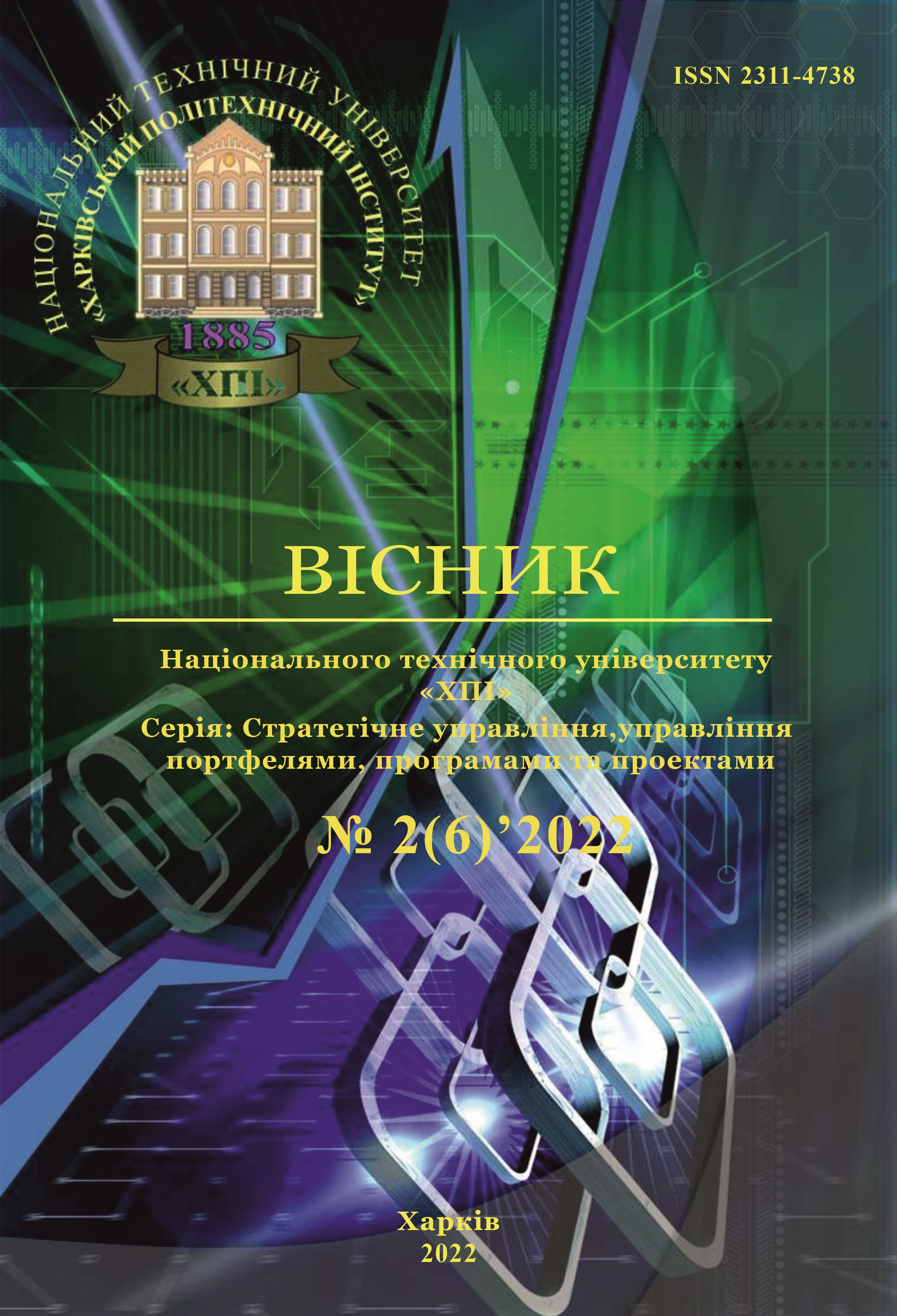CHARACTERISTICS OF ECOLOGISTIC SYSTEMS PROJECTS
DOI:
https://doi.org/10.20998/2413-3000.2022.6.9Keywords:
micro-; meso- and macro-ecologistic system; project of ecologistic system; project potential; ecologistic product; classification of ecologistic systems projectsAbstract
The negative impact of human economic activity on the environment has led to an imbalance in the economic and environmental aspects of life and the emergence of a threat of disruption to the ecosystems state, which will make it impossible for humanity to fully exist on the planet. The solution to the problem is in the plane of ecologization all spheres of management, including logistics, which has a significant impact on the state of the environment. The change in the worldview paradigm led to the emergence of the ecologically oriented logistic system concept, by which it is proposed to understand the logistic system as a set of link elements interconnected in the process of management the direct and reverse logistic flows movement, taking into account the eco-destructive impact on the environment. The article proposes to consider the management of ecologistic systems through the prism of the project approach. The purpose of the article is to characterize projects of ecologistic systems. To achieve this goal, the following tasks were solved: specific features of ecologistic systems projects were investigated; the place of ecologistic systems projects in the classification of projects was determined; a classification of ecologistic systems projects has been developed. The characteristics of the ecologistic system project as a complex cybernetic system are given, the components of the project potential are determined. The place of micro-, meso- and macro-ecologistic systems projects in the general classification of projects and the classification of investment projects has been determined. The article presents the author's classification of ecologistic systems projects. As a basic classification criterion, it is proposed to use the reason for the implementation or the purpose of the project: the creation, development or functioning of an ecologistic system. Creation projects are classified according to the product being created. Development projects are classified depending on the object or subject of management, kind and type of development. Functioning projects include projects to create an ecologistic product.
References
Organizational Project Management. PMI: Project Management Institute. URL: http://www.pmi.org/Business-Solutions/Organizational-Project-Management.aspx.
A Guidebook of Project & Program Management for Enterprise Innovation (P2M). Volume I, Revision 3. Project Management Association of Japan (PMAJ), 2005. URL: https://pmpractice.ru/knowledgebase /normative/projectstandarts/p2m/
ISO 21500: 2012. Стандарт по проектуванню. URL: https://www.iso.org/about-us.html
Бушуєв С.Д. Українська асоціація управління проектами: словник-довідник з питань управління проектами. Київ: Видавничий дім «Деловая Украина», 2001. 640 с.
ICB – IPMA Competence Baseline. Version 2.0. IPMA Editorial Committee. Bremen: Eigenverlag, 1999. 23 р.
ISO/TR 10006: 1997 (E). Quality Management – Guidelines to quality in project management. URL: https://www.iso.org/standard/2364.html
AIPM – Australian Institute for Project Management, National Competence Standard for Project Management. Guidelines, 1996. 18 р.
Вritish Standard BS 6079-1:2000. Project Management. Part 1: Guide to Project management, 58 р.
National Competence Baseline, NCB UA Version 3.0. URL: https://kn-grup.com/publications/articles/projectmanagement/18-national-competence-baseline-ncb-ua
ГОСТ Р 54869-2011 Национальный стандарт РФ. Проектный менеджмент. Требования к управлению проектом. 9 с. URL: http://docs. cntd.ru/document/gost-r-54869-2011
ГОСТ Р 56715.5-2015 Проектный менеджмент. Системы проектного менеджмента. Часть 5. Термины и определения (Переиздание). 20 с. URL: http://docs.cntd.ru/document/1200127269
Мазур И.И., Шапиро В.Д. Управление проектами : учебн. пособие для вузов. Москва: ЗАО «Издательство «Экономика», 2001. 574 с.
Митяй О.В. Проектний аналіз: навч. посіб. Київ: Знання, 2011. 311 с.
Зуб А.Т. Управление проектами: учебник и практикум для академического бакалавриата. Москва: Издательство Юрайт, 2019. 422 с.
Баркалов С.А. Математические основы управления проектами: учебн. пособие / под ред. В.Н. Буркова. Москва: Высш. шк., 2005. 423 с.
Волков А.С. Инвестиционные проекты: от моделирования до реализации. Москва: Вершина, 2006. 256 с.
Ковтун Т.А. Особенности применения системного похода к проектам. Вісник Одеського національного морського університету. Збірник наукових праць. Одеса: ОНМУ, 2011. № 32. С. 170-181.
Кендалл И., Роллинз К. Современные методы управления портфелями проектов и офис управления проектами: максимизация ROI. Москва: ЗАО «ПМСОФТ», 2004. 576 с.
Советский энциклопедический словарь: под ред. А.М. Прохорова. Москва: Советская энциклопедия, 1990. 1632 с.
Ковтун Т.А. Применение методического подхода к инициализации проекта предоставления транспортной услуги. Вісник Одеського національного морського університету. Збірник наукових праць. Одеса: ОНМУ, 2010. № 31. С. 207-222.
Ковтун Т.А. Життєвий цикл та продукти проекту екологістичної системи. Управління розвитком складних систем. 2020. № 4 (44). С. 27-33.
Downloads
Published
Issue
Section
License

This work is licensed under a Creative Commons Attribution-NonCommercial-ShareAlike 4.0 International License.
Our journal abides by the Creative Commons copyright rights and permissions for open access journals.
Authors who publish with this journal agree to the following terms:
Authors hold the copyright without restrictions and grant the journal right of first publication with the work simultaneously licensed under a Creative Commons Attribution-NonCommercial-ShareAlike 4.0 International License (CC BY-NC-SA 4.0) that allows others to share the work with an acknowledgement of the work's authorship and initial publication in this journal.
Authors are able to enter into separate, additional contractual arrangements for the non-commercial and non-exclusive distribution of the journal's published version of the work (e.g., post it to an institutional repository or publish it in a book), with an acknowledgement of its initial publication in this journal.
Authors are permitted and encouraged to post their published work online (e.g., in institutional repositories or on their website) as it can lead to productive exchanges, as well as earlier and greater citation of published work.

